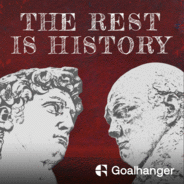
Kultur & Gesellschaft
The Rest Is History Folgen
Take a deep dive into History’s biggest moments with Tom Holland & Dominic Sandbrook. Explore the stories of History’s most brutal rulers, deadly battles, and world-changing events. From the rise and fall of the Roman Empire, the Nazi conquest of Europe, and Hitler’s evil master plan for world domination, to the French Revolution, the sinking of the Titanic, or the Norman Conquest of England in 1066, Tom and Dominic bring the past to life with gripping storytelling and expert analysis, as they unpack the high-drama moments that shaped our world. Join The Rest Is History Club: Unlock the full experience of the show – with exclusive bonus episodes, ad-free listening, early access to every series and live show tickets, a members-only newsletter, discounted books from the show, and access to our private Discord chatroom. Sign up directly at therestishistory.com. For more Goalhanger Podcasts, head to www.goalhanger.com.
Folgen von The Rest Is History
-
Folge vom 22.12.2025628. Jack The Ripper: The Killer Unmasked (Part 5)Who are the prime suspects for the identity of Jack the Ripper? Why did he suddenly halt his hellish killing spree, and never strike again? And, once and for all, who really was Jack the Ripper…? Join Dominic and Tom as they reveal, with shocking melodrama, the true identity of one of the world’s most mysterious serial killers: Jack the Ripper… _______ Hive. Know your power. Visit https://hivehome.com to find out more. _______ Give The Rest Is History Club this Christmas – a year of bonus episodes, ad-free listening, early access, the private chat community hosted on Discord, and an exclusive t-shirt! Just go to https://therestishistory.supportingcast.fm/giftsAnd of course, you can still join for yourself at any time at therestishistory.com or on apple podcasts. _______ Get our exclusive NordVPN deal here ➼ https://nordvpn.com/restishistory It's risk-free with Nord's 30-day money-back guarantee ✅ _______ For more Goalhanger Podcasts, head to www.goalhanger.com _______ Twitter: @TheRestHistory @holland_tom @dcsandbrook Video Editor: Jack Meek Social Producer: Harry Balden Assistant Producer: Aaliyah Akude Producer: Tabby Syrett Senior Producer: Theo Young-Smith Learn more about your ad choices. Visit podcastchoices.com/adchoices
-
Folge vom 18.12.2025627. Jack The Ripper: From Hell (Part 4)Why was Jack the Ripper’s final murder the most appalling of all? Who was the mysterious Mary-Jane Kelly, his unfortunate victim? And, what enduring impact would his crimes have upon the cultural climate of England, and the treatment of women? Join Tom and Dominic as they reach the nightmarish crescendo of Victorian London’s darkest days, as Jack the Ripper’s killing spree culminates with his most horrifying murder so far. Give The Rest Is History Club this Christmas – a year of bonus episodes, ad-free listening, early access, the private chat community hosted on Discord, and an exclusive t-shirt! Just go to https://therestishistory.supportingcast.fm/gifts And of course, you can still join for yourself at any time at therestishistory.com or on apple podcasts. For more Goalhanger Podcasts, head to www.goalhanger.com _______ Hive. Know your power. Visit https://hivehome.com to find out more. _______ Learn more at https://www.uber.com/onourway _______ Get our exclusive NordVPN deal here ➼ https://nordvpn.com/restishistory It's risk-free with Nord's 30-day money-back guarantee ✅ _______ Twitter: @TheRestHistory @holland_tom @dcsandbrook Video Editor: Jack Meek Social Producer: Harry Balden Assistant Producer: Aaliyah Akude Producer: Tabby Syrett Senior Producer: Theo Young-Smith Learn more about your ad choices. Visit podcastchoices.com/adchoices
-
Folge vom 15.12.2025626. Jack The Ripper: The Killer Strikes Again (Part 3)How did Jack the Ripper manage to strike twice in the same night without getting caught? Did he have an accomplice? And, what chilling clues did the police discover in the wake of the murder…? Join Dominic and Tom as they decode the next horrific phase of Jack the Ripper’s shocking killing spree, as they seek to reveal his identity once and for all. _______ Hive. Know your power. Visit https://hivehome.com to find out more. _______ Learn more at https://www.uber.com/onourway _______ Visit auraframes.co.uk and get £35 off Aura’s best-selling Carver Mat frame by using promo code HISTORY at checkout. Terms and conditions apply. _______ Join The Rest Is History Club: Unlock the full experience of the show – with exclusive bonus episodes, ad-free listening, early access to every series and live show tickets, a members-only newsletter, discounted books from the show, and access to our private Discord chatroom. Sign up directly at therestishistory.com For more Goalhanger Podcasts, head to www.goalhanger.com _______ Twitter: @TheRestHistory @holland_tom @dcsandbrook Video Editor: Jack Meek Social Producer: Harry Balden Assistant Producer: Aaliyah Akude Producer: Tabby Syrett Senior Producer: Theo Young-Smith Learn more about your ad choices. Visit podcastchoices.com/adchoices
-
Folge vom 11.12.2025625. Jack The Ripper: Horror in Whitechapel (Part 2)Who was Jack the Ripper’s second victim, and why was their murder considered the true starting point of his terrifying killing spree? How did the police investigation unfold? And, when and how did the Ripper strike again…? Join Dominic and Tom as they travel further into the dark streets of Victorian London and follow Jack the Ripper’s depraved trail, as they unravel the truth behind the world’s most famous murderer. Hive. Know your power. Visit https://hivehome.com to find out more. Learn more at https://www.uber.com/onourway Give The Rest Is History Club this Christmas – a year of bonus episodes, ad-free listening, early access, the private chat community hosted on Discord, and an exclusive t-shirt! Just go to https://therestishistory.supportingcast.fm/giftsAnd of course, you can still join for yourself at any time at therestishistory.com or on apple podcasts. Get our exclusive NordVPN deal here ➼ https://nordvpn.com/restishistory It's risk-free with Nord's 30-day money-back guarantee ✅ For more Goalhanger Podcasts, head to www.goalhanger.com _______ Twitter: @TheRestHistory @holland_tom @dcsandbrook Video Editor: Jack Meek Social Producer: Harry Balden Assistant Producer: Aaliyah Akude Producer: Tabby Syrett Senior Producer: Theo Young-Smith Learn more about your ad choices. Visit podcastchoices.com/adchoices
